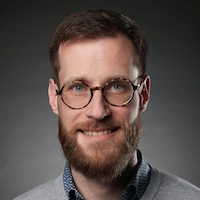Seminar Date: Tuesday, October 29, 2024
Time: 11:00 AM PT
Location: Zoom only
Talk Title: Microsecond Time-Resolved Cryo-EM
Zoom Link

Abstract:
While cryo-electron microscopy (cryo-EM) is rapidly gaining in popularity, its time resolution is frequently insufficient to directly observe proteins in action, leaving our understanding of these nanoscale machines fundamentally incomplete. My group has recently introduced a novel approach to time-resolved cryo-EM that improves its time resolution by about 3 orders of magnitude. Our method involves melting a cryo sample with a laser beam, which allows dynamics of the embedded particles to occur in liquid once a suitable stimulus is provided. While the dynamics occur, the heating laser is switched off at a well-defined point in time, causing the sample to rapidly recool, so that it vitrifies. The particles are thus trapped in their transient configurations, in which they can subsequently be imaged. We demonstrate that our approach affords a time resolution of 5 µs or better. Moreover, near-atomic resolution reconstructions can be obtained from revitrified samples, showing that the revitrification process leaves the protein structure intact. Finally, I will present a microsecond time-resolved pH jump experiment, in which we observe the dynamics of the capsid of CCMV, an icosahedral plant virus. These results highlight the potential of our method to fundamentally advance our understanding of protein function through direct observation of the dynamics involved.
Bio:
Ulrich Lorenz studied chemistry at the University of Würzburg, where he discovered his interest in molecular physics. During his PhD in the group of Prof. Thomas Rizzo at EPFL, he worked on the spectroscopy and dynamics of cryogenic molecular ions in the gas-phase, which included a fair amount of instrument development. For his postdoctoral work in the group of Prof. Ahmed Zewail at Caltech, he switched to the field of time-resolved electron microscopy, studying the dynamics of nanoscale systems. Since 2016, he has been a group leader at EPFL. His research has been supported by an ERC Starting Grant as well as a Consolidator Grant by the SNSF.

